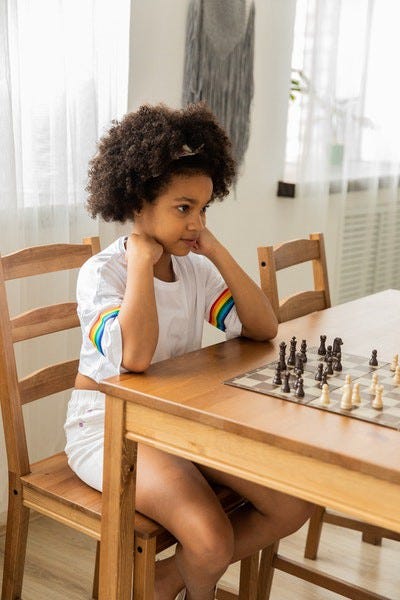Has technology improved financial literacy for black youth?
IDSC "BlackTechLogy" January 2023 Exclusive: Board games, boy crushes and my rebellion against money talk

This post is part of a series entitled “BlackTechLogy.” Click here for the archived posts.
When Christmastime came around in my preteen and teenage years, I’d already prepared my list. “The Babysitter’s Club,” “Fear Street” and “Goosebumps” books made it to the top. Then there were specific board games: “Dream Phone” (a game about narrowing down which one of 24 boys liked me); “Girl Talk Date Line” (a matchmaking game to find dates for my friends, along with myself); “Party Mania” (a game where I scrambled to complete chores so I could meet my crush at a party); and “Mall Madness” (a game to find bargain deals at a shopping center).
The pattern was clear with these games: Either spend all of my time focused on finding a (white) boyfriend or the rest on finding cute clothes to be popular. When I was bored with those games, I was back to books that either scared the bejesus out of me, or overlooking preteen girls trying to create their own babysitting careers and instead focusing on how long it would take Mary Anne and Logan to be an official couple. To describe me as a wee bit boy crazy is an understatement.

My grandfather tried to get me into more advanced board games like “Monopoly” and “Risk” as I got older, where I learned about everything from making sure all other players were bankrupt or wiping out all people who dared to cross my path on another continent. The latter game certainly taught me all about Christopher Columbus’ ways but served no other purpose. (I was also bored with “Chess” for similar reasons.)
ADVERTISEMENT ~ Amazon
As an Amazon affiliate, I earn a percentage from purchases with my referral links. I know some consumers are choosing to boycott Amazon for its DEI removal. However, after thinking about this thoroughly, I choose to continue promoting intriguing products from small businesses, women-owned businesses and (specifically) Black-owned businesses who still feature their items on Amazon. All five of my Substack publications now include a MINIMUM of one product sold by a Black-owned business. (I have visited the seller’s official site, not just the Amazon Black-owned logo, to verify this.) If you still choose to boycott, I 100% respect that decision.

In all of my childhood, and minus the character Jessica in “The Babysitter’s Club,” I genuinely just don’t remember any board games, books or educational outlets that focused on general money management. Although “Monopoly” fancies itself as teaching players about investing, the goal is to own everything, not partner up with other players to invest together. I’d be in and out of jail, collecting $200 for doing absolutely nothing and right back to buying more property in a roll of the dice. In real life, that’s not how that goes.
ADVERTISEMENT ~ Amazon
As an Amazon affiliate, I earn a percentage from purchases with my referral links.

By high school, I learned trigonometry, algebra and geometry in order to graduate, but none of those classes prepared me for financial literacy as an adult. I still have yet to find a purpose for any of the three in my day-to-day life as I knock on age 40.
Recommended Read: “English major, you do the science (and math) ~ Finding ways to make STEM interesting, even for aspiring writer children”
Financial literacy lags behind for African-Americans
In a 2018 Financial Industry Regulatory Authority (FINRA) national survey, researchers found that only one-third of American adults could correctly answer four out of five questions meant to assess basic financial literacy. In fact, the lowest rates were among youth, women and those with less education.
By racial and ethnic groups, Asian-American and white participants scored higher in financial literacy than Hispanic and African-American test takers. I cannot say I’m surprised. As both a black person and a woman, it’s not news to me that there were some lessons that were overlooked in the public school education system.
In all fairness, I did have a high-school economics teacher who tried his best to make a class full of primarily black students learn to invest in stocks and bonds. But when you grow up swiping credit cards through mall machines and scoping out boy crushes, I did exactly what I knew to do in real life: I found the first attractive boy in my class and focused all of my energy on talking to him and ignoring my teacher. I got it honestly, courtesy of all of my favorite board games.
Recommended Read: “Use the Wave app for simple invoicing ~ Perfect record-keeping website and mobile app for self-managed condo associations and small businessowners”
By the time I hit my college years and my grandfather desperately tried to make me understand certificates of deposit (CDs), stocks and bonds, it all sounded like trigonometry all over again to me. I didn’t enjoy the topic. It was too difficult to comprehend, and I just wasn’t interested. Neither was the topic of homeownership or mortgages.
Money games I played as a kid were designed to just take everyone else’s money, not really learn about principal and interest or the difference between 403(b) and 401(k). I wish I’d been introduced to that with my favorite toys and books as a kid so I could slowly work my way up to advanced financial topics.
Recommended Read: “Black book characters make black kids like me want to read more ~ Why Young, Black & Lit is onto something with its literature nonprofits”
Give or take a few people like my parents, grandparents and my great great aunt, I didn’t even know a lot of black people who owned their own homes. And finding successful black entrepreneurs was harder to find than the Mall Madness announcement for “a clearance at the department store.” I had African- and African-American history and literature lessons growing up, but I cannot remember really learning how black women like Madame C.J. Walker became a millionaire — only that she got rich off of women buying hair products. The financial literacy lessons were still getting drowned out by the shopping part.
Has technology given Generation Z a better shot at money management?
I think about my K-12 education a lot now while I binge-listen to financial literacy podcasts, such as child actress Marsai Martin’s “In the Know.” Millennials and Generation Zers are getting rich in their early 20s while I was still trying to figure out how I’d use my Creative Writing degree. What board games did they play as kids? What books did they read? How have some managed to become more financially responsible and taken more initiative when it comes to branching out to work on their own?
I’m always fascinated when people younger than myself answer these questions. Technology has made it so that even if they don’t get the lesson in school, they can press play on Spotify and get the education there instead.
I don’t regret the board games I played. I love the books I read. I enjoyed my childhood memories of boy crushes. I’m not mad at myself for spending my last dollar on $0.99 singles at Coconuts music store or using my allowance to perfectly match all of my BOSS clothes. But I have much respect for the generation under me, specifically those of color, for being more cognizant of how to use their spending power to become more financially responsible than I was at that age.
Editor’s Note: This blog has been updated and the original version was published on Our Ancestories, the blog site for author Ekiuwa Aire, who has written “Njinga of Ndongo and Matamba” and “Idia of the Benin Kingdom: Workbook.”
Did you enjoy this post? You’re also welcome to check out my Substack columns “Black Girl In a Doggone World,” “BlackTechLogy,” “Homegrown Tales,” “I Do See Color,” “One Black Woman’s Vote” and “Window Shopping” too. Subscribe to this newsletter for the weekly posts every Wednesday. Thanks for reading!




